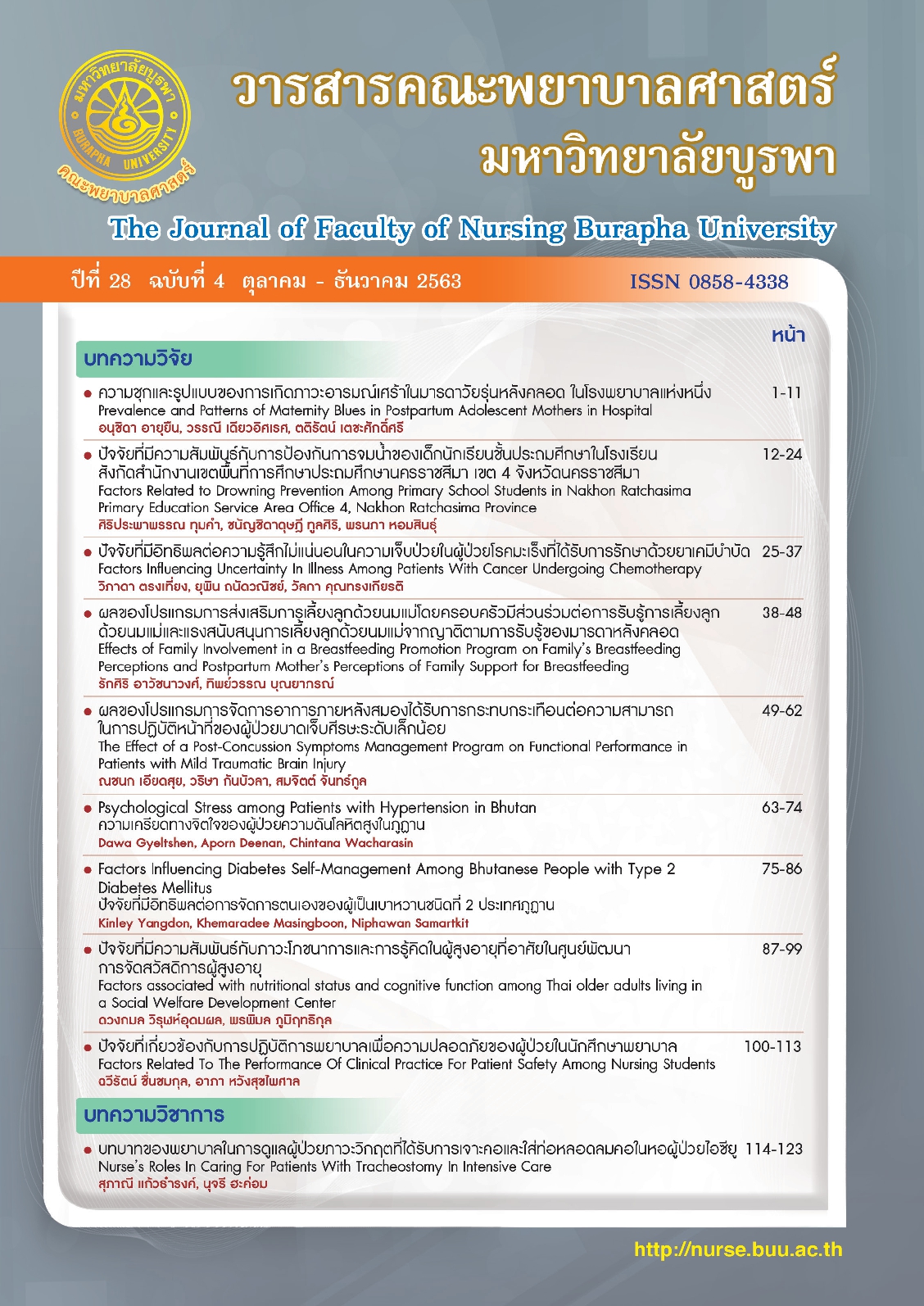ปัจจัยที่มีอิทธิพลต่อการจัดการตนเองของผู้เป็นเบาหวานชนิดที่ 2 ประเทศภูฎาน
คำสำคัญ:
การจัดการตนเองของผู้เป็นเบาหวาน, ความรอบรู้ทางสุขภาพ, การรับรู้สมรรถนะแห่งตน, การสนับสนุนทางสังคม, ความทุกข์จากเบาหวานบทคัดย่อ
ประเทศภูฎานมีจำนวนผู้เป็นเบาหวานที่ควบคุมน้ำตาลไม่ได้เพิ่มขึ้นอย่างมาก ในขณะที่ข้อมูลการจัดการตนเองของผู้เป็นเบาหวานกลุ่มนี้มีจำกัด การศึกษาครั้งนี้มีวัตถุประสงค์เพื่อศึกษาการจัดการตนเองและปัจจัยที่มีอิทธิพลต่อการจัดการตนเองของชาวภูฏานที่ป็นเบาหวานชนิดที่ 2 คัดเลือกกลุ่มตัวอย่างด้วยวิธีสุ่มอย่างง่าย ได้ผู้เป็นเบาหวานชนิดที่ 2 จำนวน 105 ราย ที่มารับการรักษาที่คลินิกเบาหวาน ณ Jigme Dorji Wangchuck National Referral Hospital, Bhutan เครื่องมือที่ใช้ในการวิจัยประกอบด้วย แบบสอบถามข้อมูลทั่วไป แบบสอบถามการจัดการตนเองของผู้เป็นเบาหวาน แบบสอบถามความรอบรู้ทางสุขภาพ แบบสอบถามการสนับสนุนทางสังคม และแบบวัดความทุกข์จากเบาหวาน วิเคราะห์ข้อมูลด้วยสถิติพรรณนาและการวิเคราะห์ถดถอยพหุคูณ
ผลการศึกษาพบว่า กลุ่มตัวอย่างมีค่าเฉลี่ยการจัดการตนเองเท่ากับ 7.6 (SD = 1.03) ปัจจัย การรับรู้สมรรถนะแห่งตน ความรอบรู้ด้านสุขภาพ การสนับสนุนทางสังคม และ ความทุกข์จากเบาหวาน ร่วมกันทำนายการจัดการตนเองของผู้เป็นเบาหวานได้ร้อยละ 17.6 โดยการรับรู้สมรรถนะแห่งตนเป็นปัจจัยเดียวที่สามารถทำนายการจัดการตนเองได้อย่างมีนัยสำคัญทางสถิติ (β = .277, p = .015) ผลการศึกษาครั้งนี้ ใช้เป็นหลักฐานเชิงประจักษ์สำหรับบุคลากรทางสุขภาพในการพัฒนาโปรแกรมการรับรู้สมรรถนะแห่งตนเพื่อส่งเสริมการจัดการตนเองในผู้เป็นเบาหวานชนิดที่ 2
เอกสารอ้างอิง
Adu, M. D., Malabu, U. H., Malau-Aduli, A. E., & Malau-Aduli, B. S. (2019). Enablers and barriers to effective diabetes self-management: A multi-national investigation. PLoS One, 14(6), e0217771.
Ahmed, Z., & Yeasmeen, F. (2016). Active family participation in diabetes self-care: A commentary. Diabetes Management, 6(5), 104-107.
Baek, R. N., Tanenbaum, M. L., & Gonzalez, J. S. (2014). Diabetes burden and diabetes distress: The buffering effect of social support. Annals of Behavioral Medicine, 48(2), 145-155.
Bailay, S. C., Brega, A. G. Crutchfield, T. M., Elasy, T., Herr, H., Kaphingst, K…….Pignone, M. (2014). Update on health literacy and diabetes. The Diabetes Educator, 40(5), 581-604.
Bandura, A. (1994). Self-efficacy In V. S. Ramachandran (Ed.), Encyclopedia of Human Behaviour (Vol. 4, pp. 71-81). New York: Academic press.
Cannon, A., Handelsman, Y., Heile, M., & Shannon, M. (2018). Burden of illness in type 2 diabetes mellitus. Journal of Managed Care & Specialty Pharmacy, 24(9), S5-S13.
Dao-Tran, T.-H., Anderson, D., Chang, A., Seib, C., & Hurst, C. (2018). Factors associated with self-management among Vietnamese adults with type 2 diabetes. Nursing Open, 5(4), 507-516. doi:10.1002/nop2.158
Dorji, S., Deenan, A., & Masingboon, K. (2017). Prediction of glycated hemoglobin (HbA1c) using physical activity, eating behavior and medication adherence in bhutanese patients with type 2 diabetes. Thai Pharmaceutical and Health Science Journal, 12(4), 166–175.
Dorji, T., Lhamo, P., Tshering, T., Zangmo, L., Choden, K., Choden, D., & Namgyal, K. (2018). Glycemic control, medication adherence, and injection practices among diabetic patients treated in the 3 tertiary referral hospitals in Bhutan: A call for more action. Asian Biomedicine, 12, 27-33. doi:10.1515/abm-2018-0028
Edwards, M., Wood, F., Davies, M., & Edwards, A. (2012). The development of health literacy in patients with a long-term health condition: The health literacy pathway model. BMC Public Health, 12(1), 130. doi:10.1186/1471-2458-12-130
Glasgow, R. E., Strycker, L. A., Toobert, D. J., & Eakin, E. (2000). A social–ecologic approach to assessing support for disease self-management: The Chronic Illness Resources Survey. Journal of Behavioral Medicine, 23(6), 559-583.
Gonzalez-Zacarias, A. A., Mavarez-Martinez, A., Arias-Morales, C. E., Stoicea, N., & Rogers, B. (2016). Impact of demographic, socioeconomic, and psychological factors on glycemic self-management in adults with type 2 diabetes mellitus. Frontiers in Public Health, 4, 195.
Gonzalez, J. S., Shreck, E., Psaros, C., & Safren, S. A. (2015). Distress and type 2 diabetes-treatment adherence: A mediating role for perceived control. Health Psychology, 34(5), 505.
Gunggu, A., Thon, C. C., & Whye Lian, C. (2016). Predictors of diabetes self-management among type 2 diabetes patients. Journal of Diabetes Research, 2016, 1-7.
IDF. (2019). IDF Diabetes Atlas. Retrieved from Brussels, Belgium: http://www.diabetesatlas.org
Ishikawa, H., Takeuchi, T., & Yano, E. (2008). Measuring functional, communicative, and critical health literacy among diabetic patients. Diabetes Care, 31(5), 874. doi:10.2337/dc07-1932
Khalooei, A., & Benrazavy, L. (2019). Diabetes Self-management and Its Related Factors among Type 2 Diabetes Patients in Primary Health Care Settings of Kerman, Southeast Iran. Journal of Pharmaceutical Research International, 1-9.
Kurnia, A. D., Amatayakul, A., & Karuncharernpanit, S. (2017). Predictors of diabetes self-management among type 2 diabetics in Indonesia: Application theory of the health promotion model. International Journal of Nursing Sciences, 4(3), 260-265.
Maneze, D., Everett, B., Astorga, C., Yogendran, D., & Salamonson, Y. (2016). The influence of health literacy and depression on diabetes self-management: A cross-sectional study. Journal of Diabetes Research, 2016.
Miller, T. A. (2013). Importance of family/social support and impact on adherence to diabetic therapy. Diabetes, Metabolic Syndrome and Obesity: Targets and Therapy, 6, 421-426.
Polonsky, W. H., Fisher, L., Earles, J., Dudl, R. J., Lees, J., Mullan, J., & Jackson, R. A. (2005). Assessing psychosocial distress in diabetes. Diabetes Care, 28(3), 626. doi:10.2337/diacare.28.3.626
Ryan, P., & Sawin, K. J. (2009). The individual and family self-management theory: Background and perspectives on context, process, and outcomes. Nursing Outlook, 57(4), 217-225.
Schinckus, L., Dangoisse, F., Van den Broucke, S., & Mikolajczak, M. (2018). When knowing is not enough: Emotional distress and depression reduce the positive effects of health literacy on diabetes self-management. Patient Education and Counseling, 101(2), 324-330.
Schmitt, A., Gahr, A., Hermanns, N., Kulzer, B., Huber, J., & Haak, T. (2013). The Diabetes Self-Management Questionnaire (DSMQ): Development and evaluation of an instrument to assess diabetes self-care activities associated with glycaemic control. Health and Quality of Life Outcomes, 11(1), 138.
Strom, J. L., & Egede, L. E. (2012). The impact of social support on outcomes in adult patients with type 2 diabetes: A systematic review. Current Diabetes Reports, 12(6), 769-781. doi:10.1007/s11892-012-0317-0
Sturt, J., Hearnshaw, H., & Wakelin, M. (2010). Validity and reliability of the DMSES UK: A measure of self-efficacy for type 2 diabetes self-management. Primary Health Care Research & Development, 11(4), 374-381.
Van der Heide, I., Uiters, E., Rademakers, J., Struijs, J. N., Schuit, A. J., & Baan, C. A. (2014). Associations among health literacy, diabetes knowledge, and self-management behavior in adults with diabetes: Results of a Dutch cross-sectional study. Journal of Health Communication, 19(sup2), 115-131. doi:10.1080/10810730.2014.936989
Weinger, K., Beverly, E. A., & Smaldone, A. (2014). Diabetes self-care and the older adult. Western Journal of Nursing Research, 36(9), 1272-1298.





